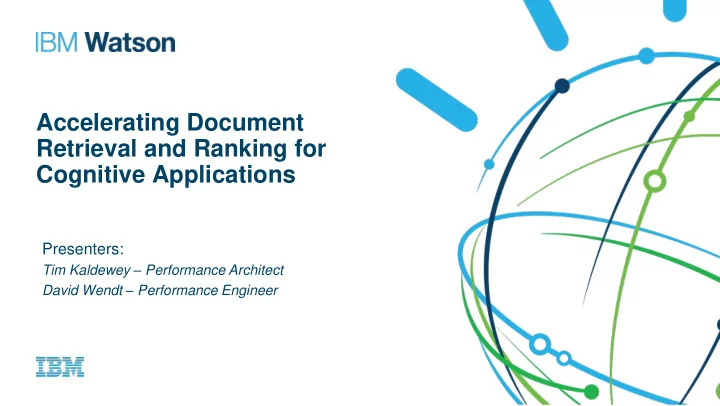

Accelerating Document Retrieval and Ranking for Cognitive Applications Presenters: Tim Kaldewey – Performance Architect David Wendt – Performance Engineer
Disclaimer The author's views expressed in this presentation do not necessarily reflect the views of IBM.
Watson evolution *http://www-03.ibm.com/software/businesscasesudies/us/en/corp?synkey=Y362451T34615G34
Watson evolution 40x* *http://www-03.ibm.com/software/businesscasestudies/us/en/corp?synkey=Y362451T34615G34
A “brainwave” for answering a question Time [ms]
Background • Querying unstructured data (text) to identify relevant documents is a prerequisite for many cognitive data processing tasks (NLP) • The large number of queries and the volume of unstructured data require a highly performant mechanism Example: - Lucene index of Wikipedia (5 million docs) is 105GB - Average search comprises 7 terms (keywords) - On average 115 thousand documents scored per search • Scoring of candidate documents and passages is highly parallelizable. ➔ Acceleration can can be leveraged to improve response time and/or enable more complex queries to improve accuracy
Document Search Index is This provincial government of Canada is officially organized in known as the government of Newfoundland and term-document what region? format • Retrieve the documents that are most likely to have the answer(s) to the question • Search for documents that contain the words from the question • Rank the documents based on – How frequent the words and word combinations appear in each document – The distance between these words in those documents
Anatomy of Lucene Query Turn text into a Lucene query to retrieve relative documents. This provincial government of Canada +canada +newfoundland +provinci +govern +offici +known^0.5 +region is officially known as the government "provinci govern"~2 "govern canada"~2 "offici known"~2^0.9 of Newfoundland and what region? "known govern"~2 "govern newfoundland"~2 "offici region"~3 • Words are stemmed and some stop words (the, of, as, …) are removed. • Key words become term clauses: canada newfoundland provinci govern offici … – Scores are computed based on term frequency. • Word pairs (phrases) become span clauses: "provinci govern"~2 … – Scores are computed based on frequency of phase and word distance between words • Complex queries (e.g. nested span clauses) can improve accuracy by scoring higher more relevant documents.
Scoring term clauses • Lucene is very efficient making only one- pass to match and score • Index format is optimized for speed in matching terms to documents • For each document, score each term clause and then sum the scores • Scorer takes three values: – Term frequency – Document length – Term probability
Scoring span clauses "provinci govern"~2 "govern canada"~2 "offici known"~2 "known govern"~2 "govern newfoundland"~2 "offici region"~3 Scoring here uses a ‘sloppy’ frequency value calculated based on how often the term pair appears and how close together the terms are to each other. Clause form: span(term1,term2,slop,order) Example: span(provinci,govern,2,false)
Scoring span clauses – continued span(provinci,govern,2,false) • Position vectors vary in length per term per document.
Analysis • Scoring for each document is independent from other documents • At the end, scores are sorted to provide the document rank order
Perfect for GPU • Floating point operations for thousands of items (documents) that can occur in parallel • Each query clause is implemented as a set of kernels and the scores accumulate in a float array where each element is the score for a unique document • The top N ranked document ids are returned to the host application
Scoring on the GPU • We used the thrust libraries for sorting and intersecting to more easily include a CPU-only alternative • All term clauses are scored first and can be calculated in a single kernel (loop) • Spans are computed to maximize caching of term position values • Once scored, the results are sorted and the top N document ids are returned along with their scores Only 5 custom kernels were required.
Results
Making it Real • Accessing the index data: ids, frequencies, positions • Managing GPU access • Recursion for nested clauses • Scoring special cases • Coverage of query types
Shared index data • First approach was to create a custom index with only the values we needed for scoring. • Sharing the index with the rest of Lucene would be ideal but how much would this cost us?
Shared index data - results
Managing GPU access • Need to handle simultaneous queries from many host threads • A dedicated set of streams – one per host thread – to handle each query • Limited the number of streams based on the available GPU memory and index size • Once the GPU is fully utilized, additional host threads can be blocked or can fallback to calling Lucene directly
Recursion for nested spans • Although CUDA supports recursion, having an unknown stack-size becomes an issue. • Implemented the recursions as loops and managed a fake stack in global memory
Query Types vs Coverage • Query types are unique combinations of search clauses: terms, spanNear, spanOr, nested spans, etc. • Coverage progression is from most common clause type to least common. .
Scoring span clauses has special cases • There are some special cases like when phrases overlap.
Conclusion • Speed up by half an order of magnitude • Many challenges: shared index, query types, recursion, … • GPU performance is even higher for complex queries – Words resulting in many documents requiring more threads – Complex span clauses with many position values • Speeding up query allows building more complex queries and scoring documents better which may help improve accuracy
Questions?
Recommend
More recommend